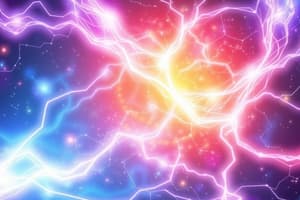Podcast
Questions and Answers
Which symptom is NOT classified as a neuromuscular symptom?
Which symptom is NOT classified as a neuromuscular symptom?
- Diarrhea (correct)
- Hyperreflexia
- Tremor
- Myoclonus
What is a common medication that can potentially cause serotonin syndrome?
What is a common medication that can potentially cause serotonin syndrome?
- Aspirin
- Ibuprofen
- SSRIs (correct)
- Acetaminophen
Which treatment is specifically indicated for managing muscle rigidity in serotonin syndrome?
Which treatment is specifically indicated for managing muscle rigidity in serotonin syndrome?
- Antibiotics
- IV fluids
- Cyproheptadine
- Benzodiazepines (correct)
Which of the following is a demographic risk factor for serotonin syndrome?
Which of the following is a demographic risk factor for serotonin syndrome?
What is a key component in the clinical diagnosis of serotonin syndrome?
What is a key component in the clinical diagnosis of serotonin syndrome?
Which of the following combinations increases the risk of developing serotonin syndrome?
Which of the following combinations increases the risk of developing serotonin syndrome?
Which of these symptoms suggests a severe case of serotonin syndrome that may require hospitalization?
Which of these symptoms suggests a severe case of serotonin syndrome that may require hospitalization?
Which of the following is considered an autonomic symptom of serotonin syndrome?
Which of the following is considered an autonomic symptom of serotonin syndrome?
Flashcards are hidden until you start studying
Study Notes
Symptoms
-
Neuromuscular Symptoms:
- Myoclonus (muscle spasms)
- Hyperreflexia (increased reflexes)
- Tremor
- Clonus (involuntary muscle contractions)
- Rigidity
-
Autonomic Symptoms:
- Hyperthermia (high body temperature)
- Sweating
- Diarrhea
- Increased heart rate (tachycardia)
- Flushing
-
Mental Status Changes:
- Agitation
- Confusion
- Hallucinations
- Coma (in severe cases)
Causes
-
Medications:
- SSRIs (Selective Serotonin Reuptake Inhibitors)
- SNRIs (Serotonin-Norepinephrine Reuptake Inhibitors)
- MAOIs (Monoamine Oxidase Inhibitors)
- Triptans (used for migraines)
- Illicit drugs (e.g., ecstasy, LSD)
- Over-the-counter supplements (e.g., St. John's Wort)
-
Drug Interactions:
- Combining serotonin-affecting drugs can increase risk.
Treatment Options
-
Immediate Actions:
- Discontinue all serotonergic medications.
- Supportive care (monitor vital signs, hydration).
-
Medications:
- Benzodiazepines (for agitation and muscle rigidity)
- Cyproheptadine (serotonin antagonist)
- IV fluids (for dehydration and electrolyte balance)
-
Severe Cases:
- Hospitalization may be required for intensive monitoring and treatment.
Risk Factors
-
Medications:
- Use of multiple serotonergic agents.
- Recent dosage increase of a serotonergic drug.
-
Medical History:
- History of serotonin syndrome.
- Coexisting medical conditions (e.g., liver disease).
-
Demographics:
- Age (higher risk in elderly).
- Substance abuse history.
Diagnosis
-
Clinical Diagnosis:
- Based on history of serotonergic medication use and symptom presentation.
-
Checking Symptoms:
- Evaluate the combination of neuromuscular, autonomic, and mental status changes.
-
Exclusion of Other Conditions:
- Rule out other causes of similar symptoms (e.g., anticholinergic toxicity, neuroleptic malignant syndrome).
Symptoms
-
Neuromuscular Symptoms:
- Myoclonus involves sudden, brief muscle spasms.
- Hyperreflexia refers to overactive or overresponsive reflexes.
- Tremor presents as involuntary shaking, often noticeable in the hands.
- Clonus consists of rhythmic, involuntary muscle contractions and relaxations.
- Rigidity denotes increased muscle tone, leading to stiffness.
-
Autonomic Symptoms:
- Hyperthermia indicates an elevated body temperature beyond normal range.
- Sweating may become excessive, often without exertion.
- Diarrhea occurs as a gastrointestinal response to stress.
- Increased heart rate, or tachycardia, can occur rapidly and continuously.
- Flushing involves rapid reddening of the skin, often around the face.
-
Mental Status Changes:
- Agitation manifests as heightened levels of anxiety and restlessness.
- Confusion denotes a lack of clarity in thought processes or awareness.
- Hallucinations include perceiving things that are not present in reality.
- Coma represents a severe state of unresponsiveness, occurring in extreme cases.
Causes
-
Medications:
- SSRIs are commonly prescribed for depression, impacting serotonin levels.
- SNRIs also affect serotonin and norepinephrine, used for similar conditions.
- MAOIs inhibit the breakdown of neurotransmitters, increasing serotonin availability.
- Triptans are often used to relieve migraines but may contribute to serotonin overload.
- Illicit drugs like ecstasy and LSD raise serotonin levels unpredictably.
- Some over-the-counter supplements, such as St. John's Wort, can influence serotonin as well.
-
Drug Interactions:
- Combining multiple serotonin-affecting drugs significantly raises the risk of serotonin syndrome.
Treatment Options
-
Immediate Actions:
- Immediate discontinuation of all serotonergic medications is crucial.
- Supportive care includes monitoring vital signs and ensuring hydration.
-
Medications:
- Benzodiazepines can help alleviate agitation and muscle rigidity.
- Cyproheptadine acts as a serotonin antagonist to counteract effects.
- IV fluids are essential for addressing dehydration and correcting electrolyte imbalances.
-
Severe Cases:
- Hospitalization may be necessary for patients requiring close monitoring and intensive treatment.
Risk Factors
-
Medications:
- Using multiple serotonergic agents heightens susceptibility.
- Recent increases in dosage of serotonergic drugs can pose additional risks.
-
Medical History:
- A prior history of serotonin syndrome raises vulnerability to recurrence.
- Coexisting conditions, like liver disease, may complicate treatment.
-
Demographics:
- Age plays a role; elderly individuals are at elevated risk for developing symptoms.
- A history of substance abuse can further increase susceptibility.
Diagnosis
-
Clinical Diagnosis:
- Diagnosis rests on a clear history of serotonergic medication use along with observed symptoms.
-
Checking Symptoms:
- A thorough evaluation of neuromuscular, autonomic, and mental status changes is critical.
-
Exclusion of Other Conditions:
- It's essential to differentiate serotonin syndrome from other diagnoses like anticholinergic toxicity or neuroleptic malignant syndrome, which present similar symptoms.
Studying That Suits You
Use AI to generate personalized quizzes and flashcards to suit your learning preferences.




